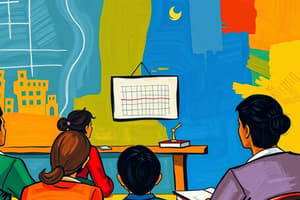Podcast
Questions and Answers
A school district decides to implement a new reading program that focuses on phonics and comprehension strategies. Which educational theory aligns BEST with this approach?
A school district decides to implement a new reading program that focuses on phonics and comprehension strategies. Which educational theory aligns BEST with this approach?
- Humanism, as it supports individual needs and self-esteem through personalized reading choices.
- Cognitivism, as it focuses on mental processes involved in understanding and problem-solving. (correct)
- Constructivism, as it encourages students to build their understanding of texts through collaborative activities.
- Behaviorism, as it emphasizes the use of rewards to reinforce reading habits.
A teacher observes that some students are struggling to grasp a new mathematical concept. Which assessment approach would be MOST effective for the teacher to adapt their instruction?
A teacher observes that some students are struggling to grasp a new mathematical concept. Which assessment approach would be MOST effective for the teacher to adapt their instruction?
- Administering a standardized test to compare these students' performance against national norms.
- Using formative assessment techniques to identify specific areas of difficulty and provide targeted support. (correct)
- Assigning a project-based assessment to allow students to demonstrate their understanding through practical application.
- Conducting a summative assessment at the end of the unit to evaluate overall learning.
A school wants to integrate technology to enhance student learning. Which approach would BEST leverage educational technology to achieve this goal?
A school wants to integrate technology to enhance student learning. Which approach would BEST leverage educational technology to achieve this goal?
- Restricting the use of technology to administrative tasks to improve efficiency.
- Replacing all textbooks with tablets to reduce the weight of students' backpacks.
- Installing interactive whiteboards in classrooms for teachers to display presentations.
- Using online learning platforms to provide access to educational resources and courses remotely. (correct)
A country's education system is struggling with significant disparities in access to quality education between urban and rural areas. Which action would MOST directly address this challenge?
A country's education system is struggling with significant disparities in access to quality education between urban and rural areas. Which action would MOST directly address this challenge?
A vocational school aims to prepare students for careers in the trades. Which educational approach would be MOST effective for achieving this goal?
A vocational school aims to prepare students for careers in the trades. Which educational approach would be MOST effective for achieving this goal?
A teacher is designing a history lesson that encourages students to question sources and form their own interpretations of historical events. Which educational theory is MOST reflected in this approach?
A teacher is designing a history lesson that encourages students to question sources and form their own interpretations of historical events. Which educational theory is MOST reflected in this approach?
A school district wants to improve student outcomes by providing targeted support to students with disabilities. Which type of educational program should they prioritize?
A school district wants to improve student outcomes by providing targeted support to students with disabilities. Which type of educational program should they prioritize?
In a classroom, students are encouraged to work together on projects, share ideas, and learn from one another. Which educational theory underlies this approach?
In a classroom, students are encouraged to work together on projects, share ideas, and learn from one another. Which educational theory underlies this approach?
A school implements a grading system where students receive detailed feedback on their work, and are given multiple opportunities to improve their performance. Which type of assessment is MOST emphasized in this system?
A school implements a grading system where students receive detailed feedback on their work, and are given multiple opportunities to improve their performance. Which type of assessment is MOST emphasized in this system?
A country aims to increase its skilled workforce to attract foreign investment and boost economic growth. Which educational investment would BEST support this goal?
A country aims to increase its skilled workforce to attract foreign investment and boost economic growth. Which educational investment would BEST support this goal?
Which educational method is MOST aligned with transmitting a society's accumulated knowledge from one generation to the next?
Which educational method is MOST aligned with transmitting a society's accumulated knowledge from one generation to the next?
A student excels in hands-on projects and group activities but struggles with traditional exams. Which alternative assessment method would BEST showcase their abilities?
A student excels in hands-on projects and group activities but struggles with traditional exams. Which alternative assessment method would BEST showcase their abilities?
What is a primary aim of education that directly contributes to economic growth?
What is a primary aim of education that directly contributes to economic growth?
Which type of education is characterized by structured learning in an established institution with set curricula and assessments?
Which type of education is characterized by structured learning in an established institution with set curricula and assessments?
A teacher wants to create a learning environment that focuses on addressing individual needs, self-esteem, and personal growth. Which educational theory aligns with this approach?
A teacher wants to create a learning environment that focuses on addressing individual needs, self-esteem, and personal growth. Which educational theory aligns with this approach?
What is the primary goal of formative assessment?
What is the primary goal of formative assessment?
What is a key challenge in education related to preparing students for the workforce?
What is a key challenge in education related to preparing students for the workforce?
Which technological tool is commonly used in classrooms to support students with disabilities?
Which technological tool is commonly used in classrooms to support students with disabilities?
A school district decides to reduce emphasis on rote memorization and increase engagement in creative projects to improve students' problem-solving skills. Which educational theory aligns BEST with this shift?
A school district decides to reduce emphasis on rote memorization and increase engagement in creative projects to improve students' problem-solving skills. Which educational theory aligns BEST with this shift?
Which of the following BEST represents the role of education in fostering social cohesion within a community?
Which of the following BEST represents the role of education in fostering social cohesion within a community?
Flashcards
Education
Education
The process of acquiring knowledge, skills, values, beliefs, and habits.
Formal education
Formal education
Learning through structured lessons in an established institution.
Informal education
Informal education
Learning through daily experiences, interactions, and self-directed activities.
Non-formal education
Non-formal education
Signup and view all the flashcards
Early childhood education
Early childhood education
Signup and view all the flashcards
Primary education
Primary education
Signup and view all the flashcards
Secondary education
Secondary education
Signup and view all the flashcards
Higher education
Higher education
Signup and view all the flashcards
Vocational education
Vocational education
Signup and view all the flashcards
Special education
Special education
Signup and view all the flashcards
Behaviorism
Behaviorism
Signup and view all the flashcards
Cognitivism
Cognitivism
Signup and view all the flashcards
Constructivism
Constructivism
Signup and view all the flashcards
Humanism
Humanism
Signup and view all the flashcards
Assessment
Assessment
Signup and view all the flashcards
Formative assessment
Formative assessment
Signup and view all the flashcards
Summative assessment
Summative assessment
Signup and view all the flashcards
Standardized tests
Standardized tests
Signup and view all the flashcards
Educational Technology
Educational Technology
Signup and view all the flashcards
Study Notes
- Education is the process of acquiring knowledge, skills, values, beliefs, and habits.
- Educational methods include teaching, training, storytelling, discussion, and directed research.
- Education frequently takes place under the guidance of educators, but learners can also educate themselves.
- Education can occur in formal or informal settings.
- Formal education is typically divided into stages such as preschool, primary school, secondary school, and tertiary education (e.g., college or university).
- The right to education is recognized by some governments and international conventions.
- A global sustainable development goal ensures inclusive and equitable quality education and promotes lifelong learning opportunities for all.
Purposes of Education
- Broadly, education aims to equip individuals with the knowledge and skills necessary to participate in society and contribute to its development.
- Education can transmit a society’s accumulated knowledge from one generation to the next.
- Education fosters critical thinking, problem-solving, and decision-making abilities.
- Education supports personal development, helping individuals realize their potential.
- Education promotes social cohesion by instilling shared values and norms.
- Education facilitates economic growth by providing a skilled workforce.
Types of Education
- Formal education involves structured learning in an established institution, with set curricula and assessments.
- Informal education occurs through daily experiences, interactions, and self-directed learning.
- Non-formal education includes organized educational activities outside the formal system, such as workshops or training programs.
- Early childhood education focuses on the development of young children, typically from infancy to age eight.
- Primary education provides basic knowledge and skills in reading, writing, and mathematics.
- Secondary education builds upon primary education, preparing students for higher education or vocational training.
- Higher education includes universities and colleges, offering advanced academic and professional programs.
- Vocational education focuses on practical skills and training for specific occupations.
- Special education addresses the needs of students with disabilities or learning differences.
Educational Theories
- Behaviorism emphasizes the role of reinforcement and conditioning in learning.
- Cognitivism focuses on mental processes such as memory, problem-solving, and information processing.
- Constructivism suggests that learners actively construct knowledge through experience and interaction.
- Humanism emphasizes the importance of individual needs, self-esteem, and personal growth in learning.
Educational Assessment
- Assessment is the process of gathering and evaluating information about student learning.
- Formative assessment is ongoing and provides feedback to improve teaching and learning.
- Summative assessment evaluates student learning at the end of a unit, course, or program.
- Standardized tests are administered under uniform conditions and scored objectively to compare performance across large groups.
- Alternative assessment methods include portfolios, projects, and performance-based tasks.
Educational Technology
- Educational technology involves the use of technology to enhance teaching and learning.
- Computers, tablets, and interactive whiteboards are commonly used in classrooms.
- Online learning platforms provide access to educational resources and courses remotely.
- Assistive technology supports students with disabilities in accessing and participating in education.
Challenges in Education
- Inequality in access to quality education persists across different regions and socioeconomic groups.
- Funding disparities affect the resources available to schools and students.
- Teacher shortages and inadequate teacher training impact the quality of instruction.
- Curriculum relevance is a concern, as education systems may not always prepare students for the demands of the modern workforce.
- Educational reforms aim to address these challenges and improve outcomes for all learners.
Studying That Suits You
Use AI to generate personalized quizzes and flashcards to suit your learning preferences.




